#challenge overview
Explore tagged Tumblr posts
Text
The Basement Lineage
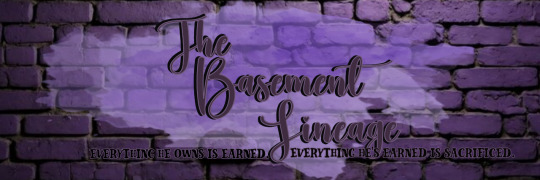
A Sims 4 Challenge of Isolation, Obsession, and Descent
"You do not begin by walking. You begin by choosing."
What Is the Basement Lineage?
The Basement Lineage is not just a Sims 4 challenge. It's a descent. A transformation. A ritual of control, survival, and self-construction in a world that offers neither comfort nor choice.
You begin as a single Sim in a single-tile basement. Stripped of access, relationships, resources, or freedom, your Founder is not a blank slate, he is a weapon waiting to be forged.
The challenge is divided into 11 Phases. Each phase represents a stage in your Sim's psychological, physical, and legacy evolution. As you descend deeper into the system, the rules constrict, the costs rise, and the expectations sharpen. There are no shortcuts, no cheats, no comfort modes.
The only way out is through.
Key Concepts
✦ Deprivation as a Game Mechanic From social starvation to need penalties, this challenge is built to hurt. Your Sim must suffer before they are allowed to thrive. Every object, relationship, and skill must be earned.
✦ Structured Isolation No roommates. No neighbors. No parties or friendly chats. Your Founder is locked away from the world, and any outside contact must be paid for, earned, or unlocked.
✦ Phase-Based Progression You unlock rooms, skills, and new freedoms by reaching specific milestones. Until then, you live in what you've earned. Nothing more.
✦ A Legacy in Reverse Unlike traditional legacy challenges, The Basement Lineage begins with nothing and slowly rebuilds upward. You don’t pass down family wealth. You build it from rot.
✦ Economic System Every Simoleon is tracked through the SimNational Bank (SNB) system. Three accounts manage your challenge: one for survival, one for sacrifice, one for legacy. Distribution is mandatory.
✦ Punishment & Penalties Break the rules? Cheat a need? WooHoo without payment? Everything has a price. Penalties are Simoleon-based and stack until paid.
✦ The Ritual of the Self This is not a passive challenge. You are expected to build a story. Whether you play silently or with journals, every choice reflects your Founder’s descent and evolution.
The 11 Phases
Each phase builds on the one before. Unlocks, skills, and income methods are phase-gated. Phases are not optional.
The Box -> Total deprivation. Earn your way out.
Submission -> The barest minimum of survival.
Performance -> Skill mastery begins here.
Threshold -> Clients. Contact. Consequences.
Ritual -> Your influence spreads.
Reaping -> Now, you feed yourself.
Echochamber -> You build your empire of thought.
Rewrite -> Novels. Obsession. Power.
Reflection -> Legacy meets excess.
Ascension -> Build above. Return changed.
The After (Optional) -> Raise the next heir. End the cycle.
Required Mods & Systems
This challenge relies on modded gameplay to function. Some features include:
Wicked Whims & Kinky Whims Traits
SimNational Bank
OnlySims career
Custom interactions for control and client management
Optional: Plumfruit Tablet, and moodlet-enhancing mods
All mod links and required downloads are listed [on the Required Mods page].
What Kind of Sim Survives This?
Your Founder isn’t random. He’s built.
You will design him with a very specific blend of traits, aspirations, and appearance. He is not meant to be sympathetic. He is not meant to be happy. He is the product of his cage, and his purpose is dominance, not comfort.
He does not get better. He gets stronger.
Storytelling Optional, Ritual Required
Not everyone will journal. Not everyone will write. But every player is expected to treat this as a ritualized challenge. That means honoring the rules, the tone, and the narrative weight of your Sim's journey.
The Basement doesn't care if you write a novel. It cares if you suffered correctly.
Begin the Descent
Before you can play, read the following in order:
[Setting Up] -> Sim setup, lot requirements, aspiration path
[Terms of Survival] -> Rules, penalties, and boundaries
[Phases & Progression] -> Unlocks and goals
[The Root Map] -> A full index of every page, post, and progression path within the challenge.
Optional: Join our Discord Server to track your journey, share your Founder, or participate in lore.
The Basement is waiting. Are you ready to choose it?
#ts4 challenge#sims 4 challenge#the basement lineage#basement lineage challenge#ts4 gameplay#sims 4 original challenge#dark sims 4 challenge#ts4 legacy gameplay#the descent begins#challenge overview
1 note
·
View note
Text

1332 – Day 3 – De Bellefaye Home



Only a few months before David Pelham’s marriage, his two-fold cousin Annette (who is his cousin by blood through her father Matthew and his mother Caroline, and his cousin by marriage through Alexandre’s mother and David’s father) celebrates her twentieth birthday.
Given the de Bellefaye family’s prominence in the city, she is planning a grand celebration later in the month, but on the day itself, she is happy enough to merely enjoy a special sweet dish with her husband, little daughter and her husband’s grandparents.
Annette has found that she enjoys being a married woman. Even playing second fiddle to Marguerite (Alexandre’s grandmother, not her Uncle Robert’s little daughter) has come with its definite advantages. Madame de Bellefaye has been a fixture in Praaven’s upper echelons for decades and knows anyone worth knowing – and even quite a few influential people beyond the county.
Annette has done what she can to learn from her, but she has found that she also enjoys things other than the social side of her position. Alexandre often takes her out of town to go riding, more often than she had been allowed since becoming an young woman. Being out in nature is oddly soothing, especially with her ever-attentive, loving husband by her side.
All things considered, she is sure that she could have drawn a far worse lot when it comes to her marriage.
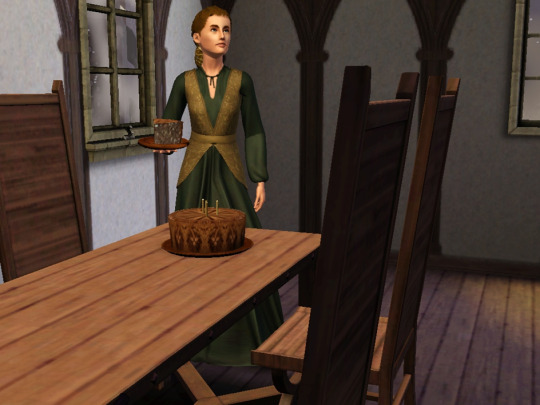


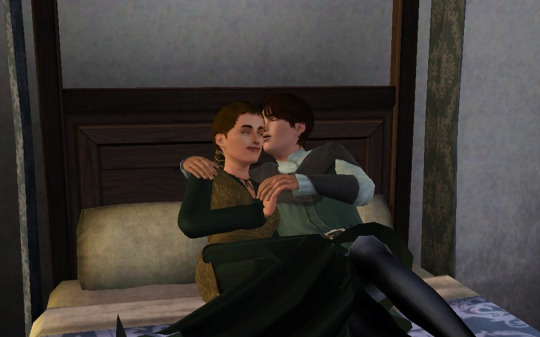
Annette had learned long ago that sometimes, when one would like to have information, it is best to simply listen. Men don’t like to discuss war with women – it’s a topic to gruesome for their gentle ears, or something along those lines – but they do sometimes forget that women are present, if the women in question are wise enough to hold their tongues.
So it is while they eat the cake their cook has prepared. At first, they talk about general topics, but eventually, Alexandre and his grandfather delve into a discussion about the Scottish campaign. Officially, King Edward (of England) has disavowed the attack, but it is common knowledge that most of the attacking host is English. And apparently, her uncle Robert is itching to be among them.
“Might be that he will join should things turn bad, and England send reinforcements. We will see how the next few months turn out.”
“While he has yet to father a living son? Brave of him”, Alexandre comments.
“Knights don’t make their fortune by staying safely home. And with those four girls, he will need ransoms or rewards for their dowries. At least if he wants to see them married well.”
“And if he is killed, my dear aunt will be left alone with them all.”
At that, Guillaume actually shrugs. “Such are the fortunes of war.”
It is hard for Annette to bite her tongue at that, but she manages. She can’t do as much when she and Alexandre are alone on their chamber later. They hadn’t meant to stay there for long, only to look in on little Guillaume and to put Juliana back into the nursery. But somehow, once that is down, they stumble into bed together. And not even to lie together, at least not in the figurative sense! They do enjoy some kisses, but in the end, Annette finds herself in Alexandre’s arms, curled up against him, still fully dressed.
“We’re going to be late, you know”, she says, mock-strict.
“I don’t think a few minutes will do any harm. I feel we’ve hardly had a moment to ourselves lately.”
“We have been busy”, she agrees. She is silent for a moment, but then she asks: “What your grandfather said about the fortunes of war…do you really think he’d abandon Lady Chevalier?”
She has met Elisaria Chevalier a few times, especially since her marriage. Her aunt always seemed a sweet woman, but…sad in a hard-to-define way. She finds she doesn’t like the thought of her being left on her own like that, and wonders what the elder Guillaume would do with herself, and her children, were anything ever to happen to Alexandre.
Her husband sighs. “I don’t know. He did give her a rather generous dowry, as far as I recall, so maybe he thinks that should be enough. He doesn’t have endless coffers, after all. And there are our children to consider now.”
“Especially if you were to go to war as well”, she says, quietly. “Going to Scotland could boost your fortunes, as well.”
“It could”, he agrees. “But unlike your uncle, I’m no knight. But I think Grandfather would like it. Well, we’ll see what comes of that campaign. Right now, I’m very comfortable here with you and our children, dear wife.”
She knows she should push him to seek glory. It’s what her grandmother Mary would advise. But somehow, she can’t bring herself to.
Previous: 1332, Day 3, Part 1/5 <--> Next: 1332, Day 3, Part 3/5
#these families are stupid interconnected#elisaria is annette's aunt by marriage twice over (as her uncle's wife and as her husband's aunt by blood)#and annette and elsie? related through their mother's Edith and Anna AND elsie's husband's mother is Annette's grandmother's sister#i have no overview anymore so if there is any accidental incest in the future i apologize#townsend legacy#ultimate decades challenge#the ultimate decades challenge#the sims 3#ts3#udc: de bellefaye family#udc: gen 2#1330s
17 notes
·
View notes
Text
A little Overview...<3

♥ Findley ♥ She/Her ♥ WCIF Friendly ♥ Always up for a wee chat! ♥

Generation 1 : Clara Kim (Beginning/Recent) Generation 2: Cora Lee Kim (Beginning/Recent) Generation 3: Reina Lin Suárez (Beginning/Recent)
DISCLAIMER: Due to Bugs that I'm not able to fix, this Legacy is completely run via neighbourhood stories and will not be actively directed by me. But I will keep updating this list, because I figured it'd be an interesting experiment to see how far this will go with only minor influence!
Character Page: Here

Generation 1: Hannah Kim (Beginning/Recent) Generation 2: Lionelle Baptiste (Beginning/Recent)
Family Tree: Here! (SPOILERS!) Character Page: Here (MASSIVE SPOILERS!)

Film Poster Project A random collection of film and show posters, recreated with my own collection of actors and actresses in an effort to make my game feel more personal.
Random Renders The title is program - random renders, either made for fun or for projects that I've yet to reveal!
Challenges Anything that isn't stricktly legacy - CAS Challenges, Template Challenges, Etc...
Character Inspirations Pretty much exactly what the title says!
#overview#pleasantviewrainfall111#masterlist#sims 4#sims 3#sims 2#sims#my sims#simblog#ts4#ts4 simblr#ts4 simbrl#simblr#the sims 4#sims 4 gameplay#sims 4 legacy#sims 4 simblr#sims 4 legacy challenge#legacy challenge#seven sins legacy#struck by love legacy
7 notes
·
View notes
Text
Pinned Post
Welcome good people of Tumblr, to the realm of Marie Magical, simmer, fantasy nerd, and amiture historian. Let me tell you a tale of an ancient family.
I am using the Ultimate Decades Overhaul (UDO) rules by Several. I have used the Ultimate Decades Challenge (UDC) rules in the past and am very familiar with Morbid Gamers rules and her own gameplay but since she has not finished her rules and has been inactive for quite a while now, I recommend the UDO. Additional Several is a qualified historian and has put quite a bit of effort into making the rules more historically accurate and applicable for more parts of the world.
I also have a few custom rolls that I have made for myself to add more randomness to my gamely. I may post them at some point.
Please! Ask any questions that you have! I love answering questions and I especially love talking about my characters and the behind the scenes of my story! As for WCIF, my mods folder is a mess so I probably won't be able to tell you where to find things but go ahead and ask! It might just be one of the few things I do know!
Now, onto the context of the Gold Legacy. I originally began this challenge for my own private gameplay but over time, as I read other people's Simblrs (shout out Thestressessimer, Soffiisims, 300yearschallange, and Aheathen_conceivably) I got the urge to share my own gameplay and the stories of my sims. At this point however I was already in 1335 and on my second gen so I have decided to start with a prologue section to catch any readers up to speed on what has happened in the story thus far. I didn't take a lot of screenshots for the first few decades so the prologue is going to be mostly writing and face cards so you know what the characters look like. I am a fantasy writer and amiture historian so hopefully this will still be very enjoyable. Just keep in mind that the style of my writing will change somewhat when I reach my current times.
Also, I am an amiture historian so I will be covering history as accurately as I can, bearing in mind that this is a video game.
This story will NOT be appropriate for everyone. I will tag posts with specific trigger warnings but keep in mind that this challenge will depict many challenging topics. In addition, people in different time periods have regarded certain topics differently than we do today and this will be reflected in my gameplay. Feel free to comment with any questions about why my sims say and do the things they do and I will try to address them. Bearing all of that in mind, this story will depict or discuss period accurate, parenting, gender roles, marriage, sex, nudity, gender, sexualiy, racism, class divides, religion, animal welfare, death, war, and more. (I will update this list if I notice anything I've left out.)
Gold Family Legacy
Gold Family Tree (under construction) | Prologue | 1330s
#Sims#Sims 4#decades challenge#ultimate decades challenge#udc#disclaimer#overview#summary#Gold Legacy#MarieMagical
3 notes
·
View notes
Text
🎉 Master "Polite Society, Valentine Style" in RDR2! 🎮
Join Arthur and Uncle on an epic journey to Valentine with our detailed guide! Learn how to tackle the mission's challenges like a pro and earn that coveted Gold Medal! 🏅
#RDR2#Red Dead Redemption 2#Polite Society Valentine Style#Arthur Morgan#Valentine Mission#Gold Medal Challenge#Gaming Guide#Walkthrough#Mission Overview#RDR2 Strategies#Adventure Gaming#Valentine Town#Wild West Gaming#Game Tips#Tips And Tricks#RDR2 Community#Mission Guide#Open World Gaming#Story Rich Games#RDR2 Gameplay#Gamer Life#Western Games#Gaming For Beginners#Game Achievements#RDR2 Gold Medal#Gaming Tutorial#Video Game Guides#RDR2 Outlaws#Cowboy Gaming#Explore Valentine
3 notes
·
View notes
Text
January’s 15-Movie Watchlist: Comfort, Chaos, and a Little Sci-Fi
The 15-Movie Challenge (AKA: Who Let Me Do This?)
At some point, I decided that this was the year I would finally watch movies instead of just saying “I need to watch that” and then rewatching The Batman for the fifth time.
But why set a normal, reasonable goal when I could make my life difficult? So, I committed to watching 15 movies per month. That’s 180 movies a year. Was this ambitious? Yes. Was this smart? We’ll find out.
Now, before anyone calls me out—rewatches are allowed in this challenge. Because while the main goal is to expand my movie catalog and finally watch all the films I’ve been meaning to, I also live in reality. And in reality, sometimes I need the cinematic equivalent of a weighted blanket (hello, Cadet Kelly).
Last January, I only watched seven movies. This January? I crushed 15. That’s double last year’s effort, which makes me feel like I deserve a trophy (or at least a participation ribbon). One of my highlights? Finally seeing Interstellar in IMAX, which is 100% the correct way to watch it unless you want Christopher Nolan to personally shake his head at you.
But if I learned anything from this month, it’s this:
I watch movies based entirely on vibes.
Some people watch movies by carefully curating a “to-watch” list. Some people follow a director’s filmography in order. I, however, choose movies like I’m picking songs for a playlist. If I’m feeling existential dread, am I picking a heavy art film? Absolutely not. I’m putting on Cow Belles like it’s an emotional support blanket. However, if the vibes demand a full-on spiral into the void, that’s when I cue up Inside.
So, let’s break it down: what I rewatched, what I saw for the first time, and what I learned about my highly specific and completely unpredictable taste in film.
1. The Rewatch Club: Nostalgia, Comfort, and Good Choices
There’s something about revisiting a favorite film that just hits differently—whether it’s soaking up a great performance, singing along to a soundtrack, or reliving childhood joy with fresh eyes. My rewatches this month included a mix of childhood staples and modern favorites:
• The Batman (2022) (5/5) → Robert Pattinson’s broody eyeliner-wearing Batman? Absolutely still a 10/10 choice. This wasn’t even an intentional rewatch—it was just on around me, and suddenly, I was fully invested.
• Bo Burnham: Inside (2021) (5/5) → Sometimes you just need a little existential dread with a catchy beat. I love this special for how weirdly relatable it is, and the songs? Still fantastic.
• Wicked (2024) (4.5/5) → Okay, I may have rewatched this too soon after seeing it in theaters, but it’s Wicked. It’s fun. Let me live.
• Jump In! (2007) (3/5) → Look, I loved this movie as a kid. And it still has some solid moments! But now, as an adult, I see it differently—not in a bad way, just with new eyes. It’s a fun, nostalgic watch, but I no longer think double dutch is the height of drama.
Takeaway: “Rewatches are comfort food for the brain. Even if a movie doesn’t fully hold up the same way (Jump In!), it’s still worth revisiting just for the vibes.”
2. First-Time Watches: Expanding the Catalogue
The real challenge of this month was watching movies I hadn’t seen before, and… let’s just say it was a mixed bag.
• Interstellar (2014) (4/5) → A mind-bending, visually stunning experience. Seeing it in IMAX was the right call because this movie is just massive in every way. My brain struggled to keep up with wormholes at 11 PM, but hey, we got there.
• It’s What’s Inside (2024) (3/5) → This started as a casual “eh, why not” Netflix watch. By the end? I was full-on shook. The twist really elevated it from just “cool concept” to “oh wowww.”
• Saturday Night (2024) (2.5/5) → This one just… didn’t hit. I wanted to like it. Maybe I missed something.
• The Brutalist (2024) (4/5) → I made the mistake of watching this on my birthday without checking trigger warnings first, and let’s just say… that was a choice.
Takeaway: “Turns out, I’m not an easy critic when it comes to new movies. My rewatches averaged 4.14/5, while my new watches sat around 3.3/5. Maybe I’m just more skeptical of unfamiliar films, or maybe they just weren’t hitting the same.”
3. What My Watchlist Says About Me
Looking at my choices, a few patterns emerge:
• I lean toward stress relief movies. (Cadet Kelly, Jump In!, Spirit: Stallion of the Cimarron)
• I like a solid drama but not when I’m overwhelmed. (Interstellar, The Brutalist, Bad Education)
• I appreciate a good surprise. (It’s What’s Inside)
• If a movie involves existential crisis + great music, I’m there. (Inside, Wicked)
This month was full of stress, and I can see my comfort picks scattered throughout my watchlist like little lifelines.
4. What’s Next?
I have no idea what I’ll watch in February, but I’m feeling a fun mystery—maybe something in the Knives Out family (but not Knives Out itself because I’ve seen it).
The one film I know I want to watch soon? Past Lives. I’ve been meaning to get to it, and I feel like it’ll fit my vibes at some point.
Will I keep up this 15-movie-a-year challenge? Hopefully! I’m going with the flow and hoping for the best. And if not… I’ll adjust.
Final Thoughts: Let’s Talk Movies!
If you’ve made it this far, first of all—thank you for indulging my deep dive into my movie-watching habits. Now I have questions for you:
What’s the best movie you watched in January?
Do you find yourself rewatching more, or are you always looking for new films?
Have you ever watched something for the first time and thought, Wow, this is just okay when everyone else hyped it up?
Let me know—I love seeing what other people watch and why!
#movies#movie challenge#Letterboxd#throwback movies#dcom movies#new movies#old movies#movie recap#January overview#movie lover#musical movies#drama movies#superhero movies#Oscar nominated movies#rewatch
1 note
·
View note
Text
Tengwar Masterlist
✍ Calma - Galadriel x Amarië
✍ Ungwë - Estë x Arien
✍ Alda - Celegorm x Tilion
✍ Unque - Gothmog x Maeglin
✍ Aha - Melkor x Fëanor
✍ Quessë - Finarfin
✍ Yanta - Elrond x River Spirit
✍ Anca - Celegorm x Dior
✍ Malta - Mairon x Nazgûl
✍ Súlë - Irmo x Gil-galad
3 notes
·
View notes
Text
Gen heir overview

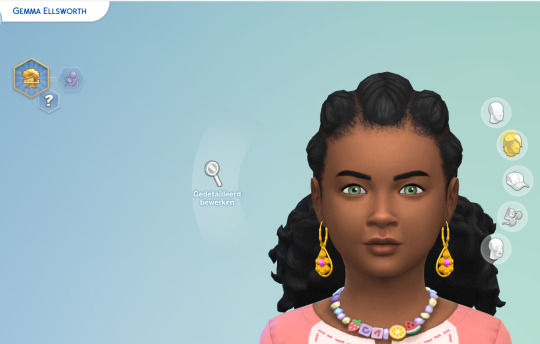

It is time for a gen 7 heir overview 🥳🥳
Gabriel Akiyama for the family dynamics challenge Gemma Ellsworth for the whimsy stories challenge Gloria Meshram for NSB
I love how fast paced these challenges are and I am so excited to slowly start the gen 7 stories
3 notes
·
View notes
Text
Running a TTRPG for complete beginners is always interesting in terms of where people fall on character concepts- like, I've seen a lot of beginners whose first question is "what can you do in the game" and then make the most basic interpretation of one of the first few archetypes they grasp (scholar wizards, knight fighters, etc), but when you go "it's a game of imagination" some of them will leap ahead with huge and amazingly specific concepts that the question is then "how do we bring this to the table mechanically according to your vision." All systems are created to do certain things and to suggest certain modes of play and archetypes- I've seen big dreams for every system I've run for or tried to set up a game for. I just really enjoy seeing both ends of the spectrum with people who are new to a game or to TTRPGs in general: what do I think the entry point is vs what is my biggest dream based on the idea of the game.
#working on setting up a small 5e game atm at work since I have a lot of coworkers who like 5e#one of my middle aged coworkers who has never really played TTRPGs and only sort of understands what they are is very excited#and when I asked for concepts to make sheets for the newbies caught me off.guard with a Big Dream character#given the idea of 'what is a concept of a guy in a fantasy that you would want to be' without a rules overview/a lot of info#had pulled out something really specific and interesting#it'll be a challenge at a low level in a game like 5e that has clear low to high power escalation built in#but I want to do what I can (without causing confusion or going too deep into untested homebrew with this table)#and I'd also like to poke around and see what games out there might have had a clear path to this character from base.#both out of interest and out of a sense of helping a newbie to the hobby see what else might interest them!#rambling
2 notes
·
View notes
Note
Hi! sorry can I ask? Are you british? And if so is the BBC trustworthy for news? I’ve tried following the news on Palestine there because I thought being british would have at least a little less bias than the news I get on my country or in my language, but it’s so weird how their narrative changes everyother day! I’m mostly reading al jazeera now,
Thanks!
Hey yeah I'm British and the BBC is hit and miss in terms of bias and accuracy. It used to be better but it is officially state funded media and therefore doesn't like to go against the government narrative, especially under the Tory government. Said government is extremely biased in favour of Israel and frankly I would intensely scrutinise any British media's reports on Palestine. Sometimes that bias is apparent in the BBC's reporting and sometimes they actually do journalism. It really seems to change day to day depending on which journalists are doing the work.
I think following al jazeera and Palestinian journalists is absolutely the best call here. Even if the BBC was a spotless perfect source, those are the people who are on the ground witnessing this horror or in personal contact with those who are, and I'd prioritise their accounts over the BBC's interpretation of their reporting. It's always best to get as close to the original source as you can.
#I usually say bbc is trustworthy but always get a second source to compare it to#because bbc won't LIE but they do repeat lies and leave them unchallenged in order to 'both sides' it#it's a good way to get an efficient quick overview of what's going on but frankly they have no bite to their journalism#they will not challenge or scrutinise anything they will simply repeat quotes
4 notes
·
View notes
Text
i appreciated this study: "They Can't Read Very Well: A Study of the Reading Comprehension Skills Of English Majors At Two Midwestern Universities"
[ETA: if you are somehow finding your way here pls note some - not exhaustive!!!! - follow up notes in this reblog. sorry again i mixed up megalodons and megalosaurs]
essentially, a pair of professors set out to test their intuitive sense that students at the college level were struggling with complex text. they recruited 85 students, a mix of english majors and english education majors - so, theoretically, people focusing on literature, and people preparing to teach adolescents how to read literature - and had them read-while-summarizing the first seven paragraphs of dickens's bleak house (or as much as they made it through in the 20 minute session). they provided dictionaries and also said students could use their phones to look up whatever they wanted, including any unfamiliar words or references. they found that the majority of the students - 58%, or 49 out of the 85 students - functionally could not understand dickens at all, and only 5% - a mere 4 out of the 85 students - proved themselves proficient readers (leaving the remaining 38%, or 32 students, as what the study authors deemed "competent" students, most of whom could understand about half the literal meaning - pretty low bar for competence - although a few of whom, they note, did much better than the rest in this group if not quite well enough to be considered proficient).
what i really appreciated about this study was its qualitative descriptions of the challenges and reading behaviors of what the authors call "problematic readers" (that bottom 58%), which resonated strongly with my own experiences of students who struggle with reading. here's their blunt big picture overview of these 49 students:
The majority of these subjects could understand very little of Bleak House and did not have effective reading tactics. All had so much trouble comprehending concrete detail in consecutive clauses and phrases that they could not link the meaning of one sentence to the next. Although it was clear that these subjects did try to use various tactics while they read the passage, they were not able to use those tactics successfully. For example, 43 percent of the problematic readers tried to look up words they did not understand, but only five percent were able to look up the meaning of a word and place it back correctly into a sentence. The subjects frequently looked up a word they did not know, realized that they did not understand the sentence the word had come from, and skipped translating the sentence altogether.
the idea that they had so much trouble with every small piece of a text that they could not connect ideas on a sentence by sentence basis is very familiar to me from teaching and tutoring, as was the habit of thought seen in the example of the student who gloms on to the word "whiskers" in a sea of confusion and guesses incorrectly that a cat is present - struggling readers, in my experience, seem to use familiar nouns as stepping stones in a flood of overwhelm, hopping as best they can from one seemingly familiar image to the next. so was this observation, building off the example of a student who misses the fact that dickens is being figurative when he imagines a megalodon stalking the streets of london:
She first guesses that the dinosaur is just “bones” and then is stuck stating that the bones are “waddling, um, all up the hill” because she can see that Dickens has the dinosaur moving. Because she cannot logically tie the ideas together, she just leaves her interpretation as is and goes on to the next sentence. Like this subject, most of the problematic readers were not concerned if their literal translations of Bleak House were not coherent, so obvious logical errors never seemed to affect them. In fact, none of the readers in this category ever questioned their own interpretations of figures of speech, no matter how irrational the results. Worse, their inability to understand figurative language was constant, even though most of the subjects had spent at least two years in literature classes that discussed figures of speech. Some could correctly identify a figure of speech, and even explain its use in a sentence, but correct responses were inconsistent and haphazard. None of the problematic readers showed any evidence that they could read recursively or fix previous errors in comprehension. They would stick to their reading tactics even if they were unhappy with the results.
i have seen this repeatedly, too - actually i was particularly taken with how similar this is to the behavior of struggling readers at much younger ages - and would summarize the hypothesis i have forged over time as: struggling readers do not expect what they read to make sense. my hypothesis for why this is the case is that their reading deficits were not attended to or remediated adequately early enough, and so, in their formative years - the early to mid elementary grades - they spent a lot of time "reading" things that did not make sense to them - in fact they spent much more time doing this than they ever did reading things that did make sense to them - and so they did not internalize a meaningful subjective sense of what it feels like to actually read things.
like, i've said this before, but the year i taught third grade i had multiple students who told me they loved reading and then when i asked them about a book they were reading revealed that they had absolutely no idea what was going on - on a really basic literal level like "didn't know who said which lines of dialogue" and "couldn't identify which things or characters given pronouns referred to" - and were as best as i could tell sort of constructing their own story along the way using these little bits of things they thought they understood. that's what "reading" was, in their heads. and they were, in the curriculum/model that we used at the private school where i taught, receiving basically no support to clarify that that was not what reading was, nor any instruction that would actually help them with what they needed to do to improve (understand sentences) - and i realized over the course of that year that the master's program that had certified me in teaching elementary school had provided me with very little understanding of how to help these kids (with perhaps the sole exception of the class i took on communications disorders, not because these kids had communications disorders but because that was the only class where we ever talked, even briefly, about things like sentence structures that students may need instruction in and practice with to comprehend independently). when it comes to the literal, basic understanding of a text, the model of reading pedagogy i was taught has about 6 million little "tools" that all boil down to telling kids who functionally can't read to try harder to read. this is not productive, in my experience and opinion, for kids whose maximum effort persistently yields confusion. but things are so dysfunctional all the way up and down the ladder that you can be a senior in college majoring in english without anyone but a pair of professors with a strong work ethic noticing that you can't actually read.
couple other notes:
obviously it's a small study but i'm not sure i see a reason to believe these are particularly outlierish results (ACT scores - an imperfect metric but not a meritless one IMO for reading specifically, where the task mostly really is to read a set of texts written for the educated layperson and answer factual questions about them - were a little bit above the national average)
the study was published last year, but the research was conducted january to april 2015. so there's no pandemic influence, no AI issue - these are millennials who now would span roughly ages 28-32 (i guess it's possible one of the four first-year students was one of the very first members of gen z lol). if you're in your late 20s or early 30s, we are talking about people your age, and whatever the culprit is here, it was happening when you were in school.
i think some people might want to blame this on NCLB but i find this unconvincing for a variety of reasons. first of all, NCLB did not pass because everyone in 2001 agreed that education was super hunky-dory; in fact, the sold a story podcast outlines how an explicit goal of NCLB was to train teachers in systematic phonics instruction, because that was not the norm when NCLB was passed, and an unfortunate outcome was that phonics became politicized in ed world. second, anyone who understands anything about reading should need about ten minutes max to spend some time on standardized test prep and recognize that if your goal is truly to maximize scores... then the vast majority of your instructional time should be spent on improving actual reading skills because you actually can't meaningfully game these tests by "practicing main idea questions" (timothy shanahan addresses this briefly near the top of this post). so i find it very difficult to believe that any school that pivoted to multiple choice drill time in an attempt to boost reading scores was teaching reading effectively pre-NCLB, because no set of competent literacy professionals would think that would work even for the goal of raising test scores. third, NCLB mandated yearly testing in grades 3-8 but only one test year in high school; kansas set its reading and math test year in high school as tenth grade. so theoretically these kids all had two years of sweet sweet freedom from NCLB in which their teachers could have done whatever the fuck they wanted to teach these kids to actually read. the fact that they didn't suggests perhaps there were other problems afoot. fourth, and maybe most saliently for this particular study, the sample text was the first seven paragraphs of a novel - in other words, the exact kind of short incomplete text that NCLB allegedly demanded excessive time spent on. i'm not really sure what universe it makes sense in that students who can't read the first seven paragraphs of a novel would have become much better reader if everything else had been the same but they had been making completely wack associations based on nonsense guesses for all 300 pages instead. (if you read the study it's really clear that for problematic readers, things go off the rails immediately, in a way that a good program targeted at teaching mastery of text of 500 words or less would have done something about.)
all but 3 of the students reported A's and B's in their english classes and, again, 69% of them are juniors and seniors, so like... i mean idk kudos to these professors for being like "hold up can these kids actually read?" but clearly something is wack at the college level too [in 2015] if you can make your way through nearly an entire english major without being able to read the first seven paragraphs of a dickens novel. (once again i really do encourage you to look at the qualitative samples in the study, lest you think i am being uncharitable by summarizing understandable misunderstandings or areas of confusion that may resolve themselves with further exposure to the text as "can't read.") not to mention the fact that most students could not what they had learned in previous or current english classes and when asked to name british and american authors and/or works of the nineteenth century, roughly half the sample at each college could name at most one.
the authors of the study are struck by the fact that students who cannot parse the first 3 sentences of bleak house feel very confident about their ability to read the entire novel, and discover that this seeming disconnect is resolved by the fact that these students seem to conceptualize "reading" as "skimming and then reading sparknotes." i think it's really tempting to Kids These Days this phenomenon (although again these are people who in some cases have now been in the workforce for a decade) and categorize it as laziness or a lack of effort, but i think that there is, as i described above, a real and sincere confusion over what "reading" is in which this makes a certain logical sense because it's not like they have some store of actual reading experiences to compare it to. i also think it's pretty obvious looking at just how wildly severed from actual textual comprehension their readings are that these are not - or at least not entirely - students who could just work harder and master the entirety of bleak house all on their own. like i don't think you get from "charles dickens is describing a bunch of dinosaur bones actually walking the streets of london" to comfortably reading nineteenth century literature by just trying harder. i really just don't (and i say that acknowledging i personally have had students who like... were good readers if i was forcing them to work at it constantly... but i have also had students, including ones getting ready to enter college, who were clearly giving me everything they had and what they had was at the present moment insufficient). i think that speaks to a missing skillset that they don't know are missing, because they don't have any other experience of "reading" to compare it to.
just wanna highlight again that although they don't give the breakdown some of these students are not just english majors but english education majors a.k.a. the high school english teachers of tomorrow. some of them may be teaching high school english right now, in case anyone wishes to consider whether "maybe some high school english teachers can't read the first seven paragraphs of bleak house?" should be kept in mind when we discuss present-day educational ills.
15K notes
·
View notes
Text
High-Level Disinfection Services Market: Safeguarding Health with Advanced Cleaning

The Importance of High-Level Disinfection: The High-Level Disinfection Services Market has seen a surge in demand as the need for sterile environments becomes more critical in hospitals, clinics, and public spaces. These services use advanced technologies and protocols to eliminate pathogens and reduce the spread of infection. 🚫 Trends: Ultraviolet (UV) disinfection, electrostatic sprayers, and automated cleaning systems. 🛡️ Impact: Boosting safety and hygiene standards, protecting patients and healthcare staff. #Disinfection #HygieneServices #HealthSafety
#<h3>High-Level Disinfection Services Market Overview</h3>#<p>The Global High-Level Disinfection Services Market has seen continuous development in the past couple of years and is anticipated to gro#Current Growth Factors#mindful sentiments#certainties#chronicled information#and factually bolstered and industry-approved market information.</p>#<p>According to Straits Research#the global High-Level Disinfection Services market size was valued at USD 28.05 Billion in 2022. It is projected to reach from USD XX Billi#growing at a CAGR of 8.3% during the forecast period (2023–2031).</p>#<p>After identifying promising candidates#they undergo extensive testing and optimization to enhance their effectiveness#safety#and pharmacokinetic properties. This entire process of High-Level Disinfection Services Market may take several years and necessitates coll#biology#and pharmacology. Irrespective of the challenges encountered during High-Level Disinfection Services Market#it has the potential to revolutionize lives by providing new treatments for various diseases.</p>#<p><strong>Request Sample Report of Global High-Level Disinfection Services Market @ <a href=https://straitsresearch.com/report/high-l#<h3>Competitive Analysis</h3>#<p>The report contains an in-depth analysis of the vendor’s profile#including financial health#business units#key business priorities#SWOT#strategies#and views.</p>#<p><em><ol>#<li>Altapure</li>#<li>STERIS</li>#<li>Microchem Laboratory</li>
0 notes
Text
Transforming Supply Chain Management: The Impact of Blockchain Technology

Blockchain technology is transforming supply chain management by enhancing transparency, traceability, and security. Its decentralized and immutable ledger provides real-time visibility into every transaction, ensuring that all stakeholders have access to accurate and verifiable data. This transparency reduces the risk of fraud and errors, builds trust among participants, and enhances the overall efficiency of supply chain operations. Blockchain's robust security features also protect against tampering and cyber-attacks, ensuring the integrity of supply chain data.
The use of smart contracts further revolutionizes supply chain processes by automating tasks such as payments, compliance checks, and inventory management. This automation reduces operational costs, accelerates transaction times, and minimizes the need for intermediaries.
Real-world applications, such as Walmart's food safety initiative and IBM and Maersk's TradeLens platform, highlight how blockchain can improve traceability, efficiency, and collaboration in supply chain management.
Despite challenges like scalability, interoperability, and regulatory uncertainties, the potential benefits of blockchain in supply chain management are driving its adoption across industries. Future trends include the integration of blockchain with IoT and AI, the evolution of smart contracts, and the development of industry-specific standards.
#blockchain development#blockchain development companies#Future Trends of Blockchain in Supply Chain Management#How Blockchain Transforms Supply Chain Processes#How does blockchain enhance transparency in the supply chain?#Introduction to Blockchain in Supply Chain Management#Overview of Supply Chain Management#The Role of Blockchain in Supply Chain Management#What are the challenges of implementing blockchain in supply chains?#What are the key benefits of blockchain in supply chain management?#What is Blockchain Technology?#web3 development#metaverse development company#blockchain development services#metaverse game development
0 notes
Text
The Edge of Innovation: Why Edge Computing Is a Big Deal
Introduction
Staying updated with the ever-evolving world of technology is vital. At TechtoIO, we pride ourselves on being at the edge of innovation. Edge computing is one of the most revolutionary developments transforming the technology landscape today. But what exactly is edge computing, and why is it such a big deal? Let’s dive into this fascinating topic to understand its significance and potential impact on our digital future. Read to continue
#Tech Trends#Tagsdge computing for autonomous vehicles#edge computing#edge computing and 5G#edge computing and AI#edge computing applications#edge computing benefits#edge computing challenges#edge computing cost efficiency#edge computing explained#edge computing for autonomous vehicles#edge computing future#edge computing impact#edge computing in healthcare#edge computing in smart cities#edge computing infrastructure#edge computing overview#edge computing real-world examples#edge computing scalability#edge computing security#edge computing technology#Technology#Science#business tech#Adobe cloud#Trends#Nvidia Drive#Analysis#Tech news#Science updates
1 note
·
View note
Text
It comes in Threes Masterlist
✍ Ages of Melkor's captivity + Fëanturi (Námo, Irmo, Nienna)
⤷ SWG ⤷ Tumblr
✍ Various virtues + see no evil, hear no evil, speak no evil (Eönwë)
⤷ SWG ⤷ Tumblr
✍ Throuple + veni vidi vici (Arien/Eönwë/Melkor x Mairon)
⤷ SWG ⤷ Tumblr
✍ SWG event post
3 notes
·
View notes
Text
Gen heir overview


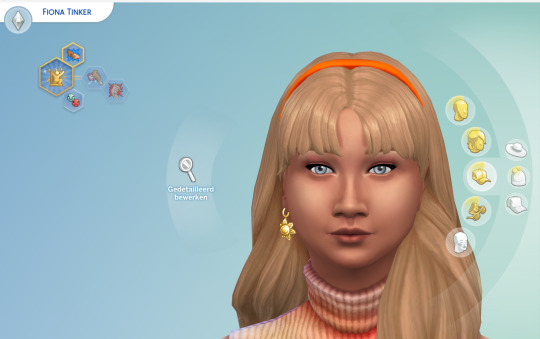
With all our gen 6 heirs now aged up into at least teens, it is time for a gen overview again.
First is Felix Akiyama for the family dynamics, he is al ready a young adult and so his gen has officially started
Second is Finley Dove of the Whimsey Stories challenge
and last is Fiona Tinker of my NSB challenge.
I am so excited to start gen 6 for my three challenges, I am over half way done 💪💪💪
#gen heir overview#ts4 gameplay#ts4 challenge#ts4 family dynamics#whimsy stories#nsb orange#gen 6#felix akiyama#finley dove#fiona tinker
4 notes
·
View notes